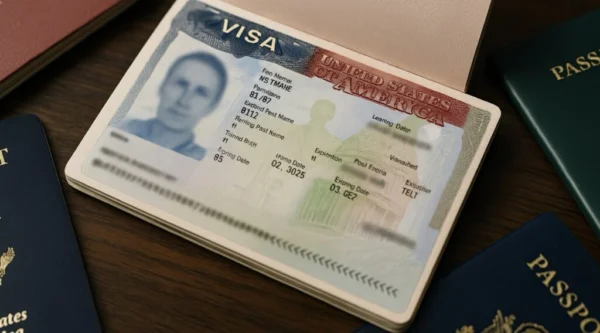New U.S. Visa Fee: Who Has to Pay $250 Now – and Who Doesn’t

The U.S. government has enacted a new visa policy that affects millions of travelers around the world. A new $250 visa bond, officially referred to as the “Visa Integrity Fee,” will be charged in addition to existing U.S. visa fees. Travelers who comply with the terms of their stay and leave the country on time may be eligible for a refund.
This measure is included in the official U.S. Federal Budget for Fiscal Year 2025, which was passed by Congress on July 1, 2025 and signed by President Donald Trump shortly after. The $250 Visa Integrity Fee is explicitly stated in the Department of Homeland Security appropriations section, where it is described as a refundable charge to ensure compliance with nonimmigrant visa terms.
G.Business reports, citing congressional documents, that the fee is part of a broader package aimed at reducing visa overstays and funding immigration enforcement.
What Is the Visa Integrity Fee
The Visa Integrity Fee is a mandatory advance payment of $250 applied to most non-immigrant visa applications(e.g., B1/B2, F, J, H, L, O categories). It is meant to encourage compliance with visa regulations and timely departure from the United States.
Refund eligibility:
- The traveler must fully comply with the visa conditions.
- The individual must leave the U.S. within the authorized stay period.
- No immigration benefit (e.g., extension, status change) may be requested during the stay.
As of July 2025, no official refund process has been published by DHS or the U.S. Department of State. Details such as forms, timelines, or platforms for requesting a refund remain unknown.
Who Is Affected by the New Fee
The fee applies to all applicants for non-immigrant visas, including:
| Visa Type | Target Group | Examples |
|---|---|---|
| B-1 / B-2 | Tourists, Business Visitors | Vacations, conferences, meetings |
| F-1 / M-1 | International Students | Degree programs, vocational training |
| J-1 | Exchange Programs | Scholars, au pairs, trainees |
| H-1B, L-1, O-1, P-1 | Temporary Workers | Skilled labor, artists, athletes |
| R-1 | Religious Workers | Clergy, missionaries |
Not affected: Citizens of Visa Waiver Program (VWP) countries – including Germany, Switzerland, Austria – who use ESTA to travel for up to 90 days for tourism or business.
Exception:
Dual nationals of countries like Iran, Syria, or Iraq (even if they also hold German or Swiss citizenship) are not eligible for ESTA and must apply for a B visa – which means they will have to pay the $250 fee.
Legal Background and Purpose
The fee is part of the "One Big Beautiful Bill Act," a comprehensive federal spending law focused on security, immigration enforcement, and budget transparency. According to the congressional budget text:
“To strengthen compliance with the terms of admission for nonimmigrant visa holders and reduce visa overstays, the Department shall collect a Visa Integrity Fee of no less than 250 USD, refundable upon verified timely departure.”
(Source: U.S. Budget FY2025, Section DHS Appropriations)
When Will the Fee Apply
The fee is legally tied to Fiscal Year 2025, which runs from:
- October 1, 2024 to September 30, 2025
However, the exact implementation date is not yet announced. Experts expect rollout to begin by fall 2025, when U.S. visa application systems (e.g., DS-160) are updated to include the new charge.
What Travelers and Migrants Should Do Now
- Check whether you need a visa – ESTA may still apply.
- Clarify your visa category – don’t overpay if exempt.
- Add $250 to your budget if applying for a U.S. visa.
- Understand that no fee is charged if the application is denied.
- Monitor U.S. embassy websites for refund instructions.
Example Cases
Case A: German Student in New York
Anna from Hamburg will begin a degree program at NYU in Fall 2025. She needs an F-1 student visa and must pay the $250 Visa Integrity Fee in addition to SEVIS and embassy fees. If she leaves on time, she may request a refund.
Case B: Swiss Business Traveler Using ESTA
Markus from Zurich is visiting Boston for 10 days. He enters with ESTA and is therefore not subject to the new fee.
Case C: Syrian Migrant Residing in Germany
Hassan, a permanent resident in Germany with a Syrian passport, must apply for a B-2 tourist visa to visit the U.S. He is required to pay the new $250 fee.
The Visa Integrity Fee marks a significant change in U.S. immigration and border enforcement. It targets overstay prevention and cost recovery for enforcement measures. While refund eligibility may make the fee temporary for law-abiding travelers, it also introduces bureaucratic uncertainty and financial barriers, especially for students, cultural exchange visitors, and migrants.